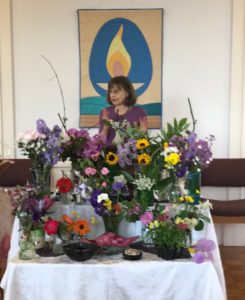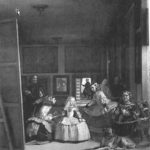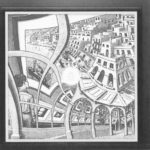Harrisonburg Unitarian Universalist Flower Communion
May 5, 2019
Facilitator: Martha Sider

2019 Flower Communion
The title of today’s service is taken from the song “ White Coral Bells†You’ll find it printed on the insert to the OOS. White coral bells upon a slender stalk, Lilies of the Valley deck my garden walk… I, like many children, was introduced to this song at summer camp, Kenbrook Bible Camp. And yes, at that camp we sang mainly specifically Christian songs around the campfire, but this song I learned with a group of girls in the cabin with our counselor at lights out time. We sang it as a round, our little girl voices joined together, and I loved being a part of that community. Many years later, the Lilies of the Valley in my garden today are a gift of this community shared from Cathy and Charlie’s garden.
Lilies of the Valley hold much significance around the world – they are said to bring luck, used in weddings to symbolize purity, in Christian lore (mentioned 15 times in the Bible) used to symbolize tears (Eve’s, the Virgin Mary’s, Mary Magdalene’s at the cross of Jesus) and in some folklore they are believed to protect from evil spirits, charm against witches spells and considered the flowers of the fairies, their tiny bells used as cups from which to drink. Some in European countries hold the belief that Lilies of the Valley prompt visions of heaven.
However, aside from folklore, I think these beautiful, sweetly scented flowers call us to an awareness of our HUU community.
- Lilies of the Valley form extensive colonies by spreading underground. New shoots are formed at the ends of stolons, but they stay connected to the other shoots underground.
- They are complex, holding together in one stalk the poisonous and the healing.
- They are strong, returning year after year, pushing through the darkness, the layers of earth and the mulch that may have been heaped upon them.
- They are also delicate, susceptible to the stress of high temperatures and in need of the sheltering shade of other garden plants.
We are the lilies of the Shenandoah Valley, white coral bells. “Oh, don’t you wish that you could hear them ring? That will happen only when the fairies sing.†In this religious community where as we often sing “we seek elusive answers to the questions of this life†and can claim that “even to question, truly is an answer,†that will happen only when we open ourselves to the experience of transcending wonder and mystery.
Today our four readers will offer words that hopefully inspire us to seek the “direct experience of that transcending mystery and wonder” stated as one of the many sources from which we draw. [Read more…]






